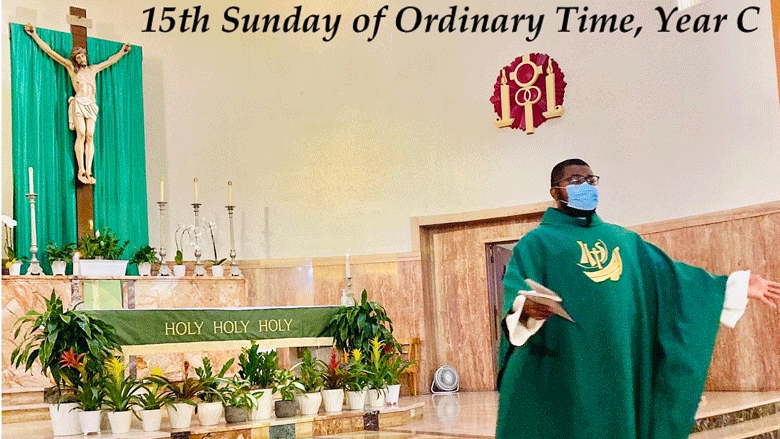15th Sunday of Ordinary Time, Year C
We live in a society or world that can be sometimes very selfish, cruel and greedy, that we go along with those practices without paying attention to the harm it causes to others. For instance look at the situation in our country and in other parts of the world that people are treated like as if they are not human. People are discriminated against because of their race, gender, religion, ethnicity, education, economic status etc. Look at our case here in the United States of America, where immigrants are being treated inhumanely and yanked away from their families and many are suffering and living in fear. The experiences of our brothers and sisters who are undergoing these horrific experiences and treatments can be likened with the experience of the victim of the robbers on the road from Jerusalem to Jericho.
In today’s gospel reading, we hear the story of how the good samaritan helped out the victim of the robbers on the road from Jerusalem to Jericho. My dear friends in Christ, today we are the ones journeying on that road from Jerusalem to Jericho, where robbers have left their victims half dead. Are we the priest or the Levite who passed by on the opposite side of the man who fell victim to robbers, who was stripped, beaten and left half-dead? Or are we the Samaritan, who was moved with compassion, poured oil and wine over the victim’s wounds, bandaged them, lifted him up on his own animal, took him to an inn, and cared for him?
This road from Jerusalem to Jericho runs through the church, our homes, our work places, our schools etc. On this road, we encounter many people who are slightly or seriously wounded in spirit because of their language, race, upbringing, economic status, educational qualifications and even their religion. Today’s gospel reading challenges us and calls us to promote love and to reach out to these our brothers and sisters facing such challenges, to assist them, to console them, to help them, to pray for them and to be with them.
Jesus in today’s gospel reading not only shows us who our neighbor is, but He encourages us by giving us the strength, the courage, and the knowledge to love others better by wishing them good from our hearts, by rejoicing with them in their prosperity and by grieving with them in their adversity or sorrows. In fact, Jesus in today’s gospel reading with the parable of the good samaritan teaches us how we can love others better both physically and spiritually. Jesus teaches us how to love others better by emphasizing the practice of the corporal works of mercy, which concentrates on the physical needs of others and on practical ways to live out Christian love and charity because they reflect God's own merciful nature. Jesus also teaches us the spiritual works of mercy, which are acts of mercy considered essential for living a true life of Christian charity and compassion, and which are focused on addressing the spiritual and emotional needs of others. What are the corporal works of mercy and the spiritual works of mercy?
The corporal works of mercy are as follows:
- Feeding the hungry, that is to provide food to those who lack it.
- Giving drink to the thirsty, which means giving water or other beverages to those who are thirsty or dehydrated.
- Clothing the naked, that is donating clothes to those who are in need of them.
- Sheltering the homeless, which entails providing a place of shelter for those without a place to sleep or stay.
- Visiting the sick, and offering them companionship and prayers and even caring for those who are ill.
- Visiting the imprisoned or incarcerated and providing comfort and support to them.
- Burying the dead, which means properly burying deceased individuals by showing respect for the dead and offering comfort to their grieving relatives.
The spiritual works of mercy are as follows:
- Admonishing the sinner, by gently correcting our brothers and sisters making the wrong choices in life.
- Instructing the ignorant, by teaching and sharing the knowledge of our Catholic faith, doctrines and morals with those who are in need of it.
- Counseling the doubtful by correctly advising and offering guidance to those who are unsure or hesitant.
- Comforting the sorrowful by consoling and supporting those who are grieving or suffering.
- Bearing wrongs patiently to ensure peace and to endure injustice and mistreatment without resentment.
- Forgiving all injuries and letting go of grudges so as to offer forgiveness to those who have hurt us.
- Praying for the living and the dead, because as God’s children, it is our duty to pray for the well-being of all.
So my dear friends in Christ, let us resolve today to be good samaritans to our brothers and sisters who are down, who are experiencing difficult situations in life, who are seriously wounded in spirit and who are undergoing horrific experiences and treatments because of their language, race, upbringing, economic status, educational qualifications and even their religion. Let us truly live out the corporal works of mercy and the spiritual works of mercy as taught us by Jesus today, because what you did to your neighbor or one of God’s little ones, you did to God and God will not forget it when your hour of judgment comes.





